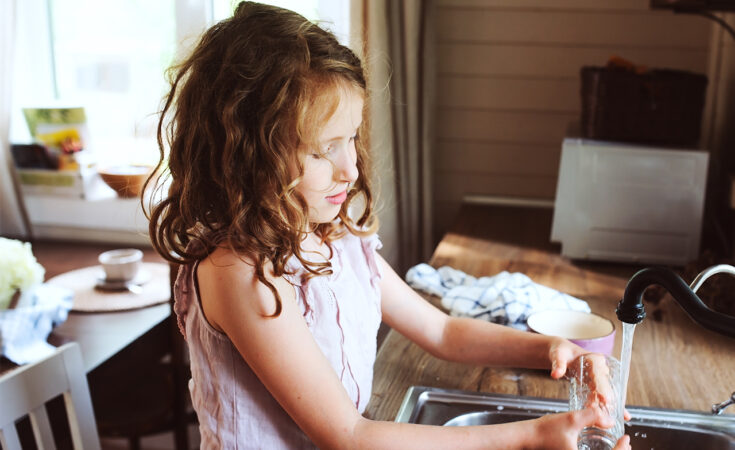At the start of the school year, Lonnie Starling was struggling with her eight-year-old son’s behaviour. Another kid at school was being mean to him, and he was acting out at home by throwing tantrums, pushing, shoving and kicking. The Calgary mom remembered that using positive reinforcement—that is, focusing on the positive things he was doing, rather than constantly correcting his behaviour—had been effective to influence his actions when he was a toddler, so she got into the habit of praising him again.
“When he does something good, we kind of go overboard. We make a huge deal of it—if he’s helpful with things around the house, when he shovels the walk,” explains Starling. “His sister was upset and he brought her a stuffie. I said, ‘You’re such a good brother, that was so thoughtful of you.’”
After repeatedly catching her son being good, and commenting on it, the physical aggression and tantrums tapered off, and he began doing a better job of communicating, with words, when he was upset. For Starling, positive reinforcement worked like a charm.
What is positive reinforcement?
The idea behind this parenting strategy is simple: children respond better to kudos than they do to criticism or correction. If parents make a big deal of it when their kids share, show kindness, do their chores, or play quietly while Mom is on the phone, they’ll do more of these things because they like the good feelings that come with the positive attention.
“It’s just human nature that people, and kids, too, want to be acknowledged and recognized and they want to be appreciated. It’s nice to be noticed,” explains Judy Arnall, the Calgary-based author of four books on non-punitive parenting including Parenting With Patience and Discipline Without Distress.
Positive reinforcement is an example of operant conditioning, a psychological term that refers to when behaviour is strengthened or weakened by positive or negative reinforcements.
Positive reinforcement examples
It’s actually pretty easy to reinforce the behaviour you want to see—you don’t need to throw a party!
Research indicates that the most effective form of positive reinforcement is verbal praise, says Susan Birch, associate professor in psychology at the University of British Columbia. But there are other things you can try:
- a hug
- stickers
- toys
- a thumbs up
- applause
- treats
- extra privileges (e.g., more screen time)
What if my kids don’t do anything positive?
Our kids all do positive things, it’s just that the misbehaviour is more obvious because it’s often loud and obnoxious, like siblings fighting, or a child screaming because she didn’t get what she wanted. On the other hand, good behaviour is often quiet, like playing independently or doing homework.
“Find those moments—even if they’re rare—when the child is doing what you want,” says Birch. “We have to make an active effort to pay attention.” You might comment, for example, on how quietly your kids are sitting in their carseats, or if you notice them helping a younger sibling.
Parents can also look for positives in an annoying situation instead of focusing on the negative. A mom I know caught her kid dancing around the room with one sock on while the other lay untouched on the floor. Rather than admonish him for goofing off (which gives attention to a negative behavior) or nag him to get going on the second sock, she said, “Wow, you’ve got one sock on!” The acknowledgement of his accomplishment motivated him to repeat the sock success on the other foot.
The right type of reinforcement
The most effective form of praise is praise for the effort rather than the outcome, says Birch. Saying, for example, ‘I’m really proud of you for studying so hard’, is better than saying you are proud of the grade they got.
Toronto mom-of-three Katie Ford*, who has been using positive reinforcement since her youngest was in kindergarten, aims for five specific praises to every corrective statement. So if she got a phone call from the school that her youngest, who is now 13, has gotten into trouble at school, she’ll open with, “I’m so happy you’re home,” and then comment on how organized he is when he unpacks his backpack, and perhaps finds a few more things to praise or joke around about (her son responds well to humour) before she addresses the misbehaviour.
If your house has been more of a negative environment in the past, your kids might be skeptical of all the praise, says Birch. But by being sincere and consistent, it will soon start to feel more natural.
What do I do about bad behaviour?
It might go entirely against your intuition, but if the behaviour isn’t dangerous, but rather just inappropriate or attention-seeking (think whining or making fart noises) you can ignore it or even leave the room.
In her own family, Arnall has been known to ignore irritating behaviours like a child kicking at a table leg. “If it’s just annoying then I leave the room,” she explains.
One strategy, says Catherine Lee, a professor emerita of psychology at the University of Ottawa, and a trainer with Triple P Parenting Canada, is to still be aware of those behaviours, but don’t comment on them. Then, the minute the whining, blowing raspberries or table leg kicking stops, you can give the child your attention by asking about his day at school, for instance. This way the kid learns that these behaviours are not effective ways to get their parents’ attention.
If your kid’s behaviour is aggressive or dangerous, you’ll need to get involved by removing them from the situation. Arnall suggests reminding them that ‘this is not how we act in this family.’ In Starling’s house, the consequence of aggressive behaviour is the loss of weekend screen time, but her kids can earn it back by being good.
Should I give a reward for good behaviour?
It may seem logical to reward good behaviour with a treat or a toy, as well as praise, but when you offer the reward as an incentive you are entering bribe territory, says Arnall. Unlike praise and positive attention, bribes don’t encourage a long-term change in behaviour. So if you want to give your kid a cookie for emptying the dishwasher, go for it. But don’t expect your kid to suddenly love emptying the dishwasher. Rewards can be helpful, however, in short-term, temporary scenarios, such as doling out a Smartie for going poop on the toilet, then phasing it out once the toddler is, ahem, regular.
Schedules of reinforcement
Just how often do you need to dole out positive feedback to ensure it works? For younger kids, the more often, the better—not just because it will work faster, but because you’ll get better at it.
“The more you do it, the easier it is to notice those opportunities and the more good behaviour you’ll see. It sort of snowballs,” says Birch. “It can actually dramatically change the mood in the household once the focus is on the positive.”
Does positive reinforcement actually work?
Just as sleep begets sleep, positivity breeds positivity. It’s infectious.
In fact, research on positive parenting shows that stress levels for kids (and parents) come down because everyone starts being more positive.
But many families, Starling’s included, note that it’s hard to stay rosy, especially when you’re in “triage mode” during a tantrum. Arnall says that with practice it can become a more natural habit. She suggests doing things like regularly adding a note to a kid’s lunch telling him you’re so happy he’s your kid, for example, or that you’re proud of him for running so hard during his soccer game the night before. Physical reminders like a marble jar, where you fill it up at the beginning of the day (use different colours for different kids) then take a marble out every time you praise your child, can help you stay on track. One family Arnall knows placed a bell on the kitchen island, then anytime someone needed a hug they could ring it. This strategy empowered the kids to ask for positive attention without having to actually say, “I need some love right now.”
Starling, who took a 12-week parenting course that focused on positive reinforcement, uses the strategy with her 5-year-old daughter as well as her son. By regularly saying things like, “It makes me really happy when you’re nice to your sister,” or, “I really appreciate it when you help with dinner,” they’ve been doing more of the things she’d like and the overall mood in their house has improved.
It’s true: Make an effort to start noticing the good and the whole family will be rewarded.
Stay in touch
Subscribe to Today’s Parent’s daily newsletter for our best parenting news, tips, essays and recipes.



































